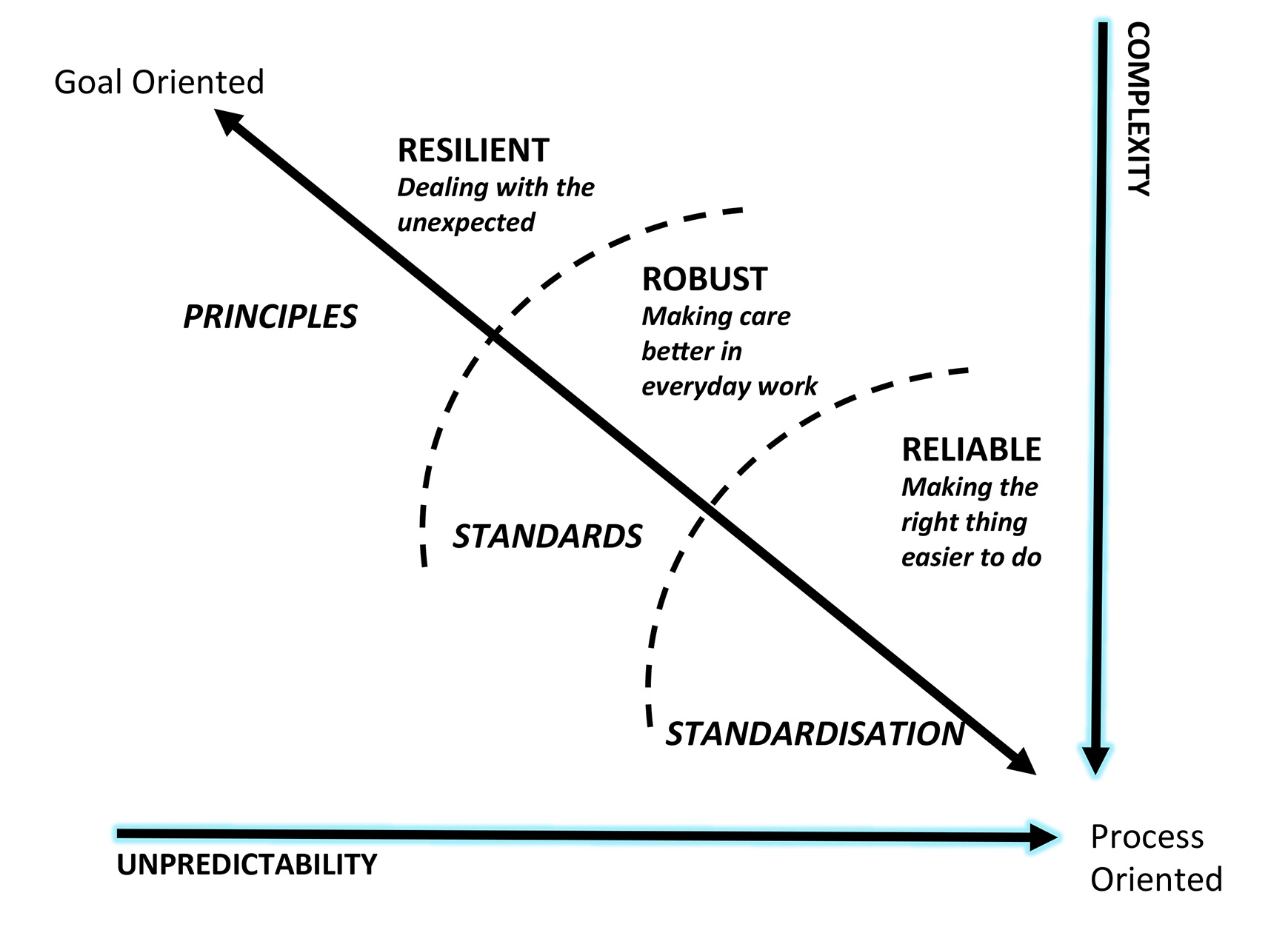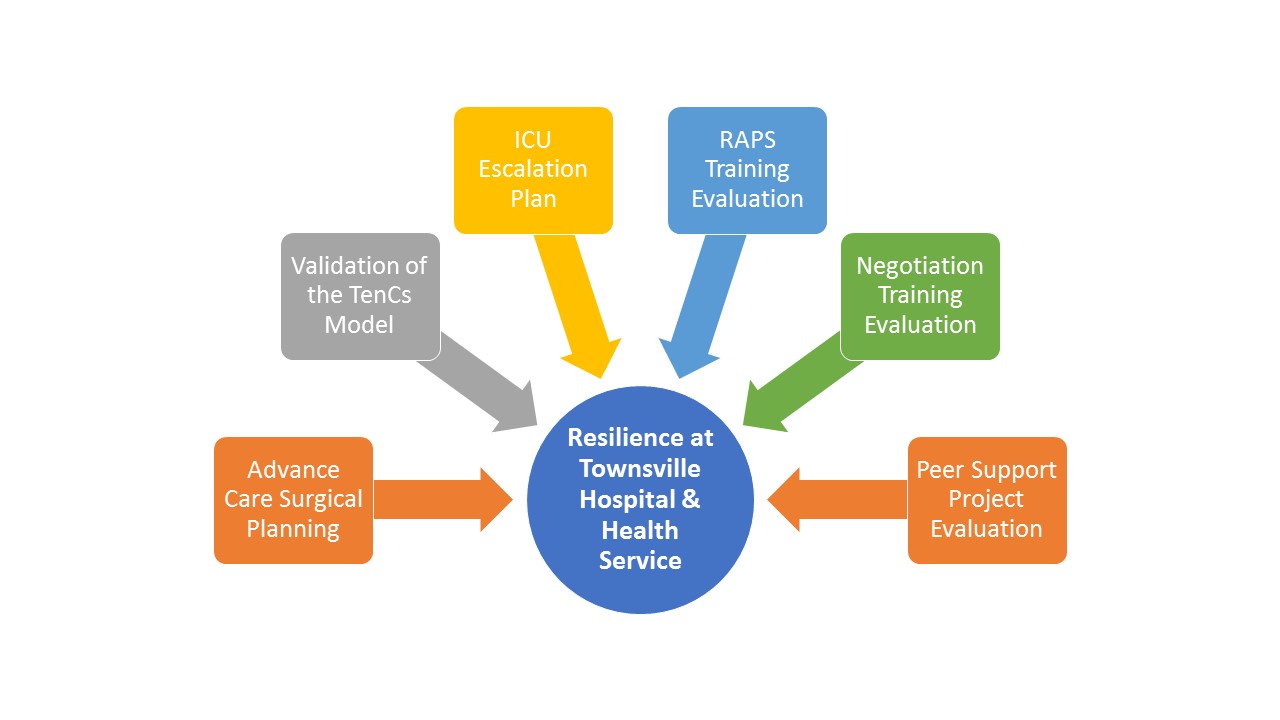Organisational resilience at Townsville Hospital

Project Members - Macquarie University
Robyn Clay-Williams - Associate Professor
E:robyn.clay-williams@mq.edu.au
Project Members - External
Townsville Hospital and Health Service investigators:
- Dr Paul Lane
- A/Prof Andrew Johnson
- Dr Siva Senthuran
- Ms Lauren Camilleri
Project Main Description
The project consists of four inter-related studies evaluating the implementation of organisational resilience-based interventions at Townsville Hospital and Health Service (THHS):
Study 1: Evaluation of the ICU Escalation Plan
Study 2: Evaluation of the Resilience and Patient Safety (RAPS) Training
Study 3: Evaluation of Negotiation Training (read the report here).
Study 4: Evaluation of Patient Centred Advanced Care Surgical Planning
Study 5: Validation of the TenCs Model

Background
Safety in healthcare remains problematic. This is despite concerted efforts to understand why errors occur and to place protective barriers in the healthcare system.1 Resilience in healthcare represents a new way of thinking about patient safety that leverages our understanding about what goes right in the workplace to improve processes of care. Resilience is the ability of a system “to adjust its functioning prior to, during, or following changes and disturbances, so that it can sustain required operations under both expected and unexpected conditions”.2 A resilient system can allow safety to occur even at ‘the edge of chaos’, when the system is strained beyond equilibrium.3 Previous research has identified ten traits that contribute to resilient healthcare.4 The traits will allow clinicians to operate safely within the constraints of a complex and demanding work environment. Clinicians at THHS have developed a number of interventions aimed at introducing resilient processes and the TenCs Model to healthcare professionals. This project will evaluate implementation of four of these interventions.
Aims
Study 1 aims to evaluate the effectiveness an ICU intervention, consisting of an Escalation Work Place Instruction with simultaneous education and training on resilient healthcare, which will be implemented in the ICU at THHS. Evidence synthesised from this evaluation will be used to inform hospital executive of the influence of resilient healthcare principles on operational planning and patient safety.
Study 2 aims to determine whether the RAPS training course is successful in providing staff with an understanding of resilient healthcare principles, and the skills necessary to improve resilient behaviours in the workplace. It will provide evidence on translation into practice to add to the growing amount of research about resilient healthcare, and provide staff with the appropriate tools to survive in an increasingly stressful environment, delivering safe care on ‘the edge of chaos’. It will also add to an understanding of how resilient healthcare training might best be implemented in other healthcare settings.
Study 3 aims to evaluate the effectiveness of the THHS intensive negotiation training by investigating whether staff members have implemented the integrative bargaining skills in the time period since the training, and if so, how and when.
Study 4 aims toevaluate the feasibility of the new patient-centred advanced care planning surgical model of care, including potential benefits to patients and clinicians. Evidence synthesised from this evaluation will be used to inform future guidelines for surgery on frail high-risk patients at THHS.
Study 5 aims to further develop and validate the TenCs Model, a model of individual and team resilient behaviours that emerged from THHS over the last 5 years.
Benefits
The expected benefit to the local Townsville and regional community includes:
- Establishment of a safer Hospital environment through building resilience.
- Improved efficiencies through resilience planning and engagement.
- Improved staff well-being and retention due to their increased ability to identify margins and put measures in place to manage ever increasing stress in the work environment.
Publications
- Debono D, Clay-Williams R, Taylor N, Greenfield D, Black D and Braithwaite J. Using workarounds to examine characteristics of resilience in action In: Hollnagel, E., Braithwaite, J. and Wears, R. L. (eds) The field guide to Resilient Health Care, United Kingdom, Ashgate Publishing: (accepted 17th February, 2016).
- Clay-Williams R, Braithwaite J. Realigning work-as-imagined and work-as-done: can training help?. In: Braithwaite J, Wears R, Hollnagel E, editors. Reconciling work-as-imagined and work-as-done. Surrey, UK: Ashgate Publishing Limited, 2016.
- Clay-Williams R, Hounsgaard J, Hollnagel E. Where the rubber meets the road: using FRAM to align work-as-imagined with work-as-done when implementing clinical guidelines. Implementation Science 2015; 10:125.
- Clay-Williams R, Johnson J, Debono D, Braithwaite J. The path from policy to practice: resilience of everyday work in acute settings. In: Waldorff S, Pedersen A, Ferlie E, Fitzgerald L, editors. Managing change - from health policy to practice. Palgrave Publishing, 2015.
- Lane P, Clay-Williams R, Johnson A (2015). The Ten Cs Model: a case from Townsville Australia. Abstract and presentation at: Resilient Health Care: moving from Safety-I to Safety-II Conference. Sydney, Australia, 10 August.
- Lane P, Clay-Williams R (2015). The ICU Escalation Plan: a case from Townsville Australia. Abstract and presentation at: 2015 Resilient Health Care Net (RHCN) Conference. Sydney, Australia, 11-13 August.
References
- Runciman WB, Hunt TD, Hannaford NA, et al. CareTrack: assessing the appropriateness of health care delivery in Australia. Medical Journal of Australia 2012;197(10):549.
- Hollnagel E, Pariès J, Woods DD, et al. Resilience engineering in practice: a guidebook. Surrey, UK: Ashgate Publishing Limited, 2011.
- Cook R, Rasmussen J. “Going solid”: a model of system dynamics and consequences for patient safety. Quality and Safety in Health Care 2005;14(2):130.
- Lane P, Clay-Williams R, Johnson A (2015). The Ten Cs Model: a case from Townsville Australia. Abstract and presentation at: Resilient Health Care: moving from Safety-I to Safety-II Conference. Sydney, Australia, 10 August.
Project Sponsors
Townsville Hospital and Health Service
Collaborative Partners
Project Status
Centres Related to this Project
Content owner: Australian Institute of Health Innovation Last updated: 11 Mar 2024 7:05pm
